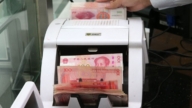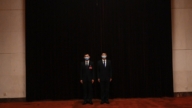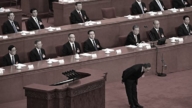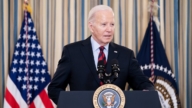【新唐人2012年1月13日讯】“唱红打黑”的左派薄熙来受到中共媒体力挺,外界评论这增加了薄十八大入常委的机会。但薄熙来的主要对手—-广东省委书记汪洋也不甘落后,汪洋发出豪语:广东要成为民族复兴动力。但是学者指出,中国百姓被剥夺了一切制约中共政府的权利,祈求中共内部出现“青天”,无异于望梅止渴,中国老百姓已经不再信任中共。
尽管外界对薄熙来所宣导的“唱红打黑”颇有非议,但中共机关报《人民日报》1月9号,在头版头条的位置刊出长篇报导,盛赞薄熙来促进重庆共同富裕的做法,并指出,这符合胡锦涛所提倡的科学发展观。
“美国纽约城市大学”政治学教授夏明:“工人、农民、低收入人群,他们有很多不满,薄熙来想通过民粹主义的方式、通过民众动员,尤其是用毛泽东的传统的政治思想动员他们,应该说是增加了他的政治资本。”
不过由于薄熙来主要的右翼对手汪洋所在的广东,这一年多来频繁发生群体抗争,而且他在处理乌坎村事件上的所谓“软弱”表现,使他入常委的机会变得扑朔迷离。媒体甚至预测汪洋已经出局。
夏明表示,现在的中国处处充满了愤怒,从政治、宗教、经济等方面的抗争都很强烈。有学者估计,每年中国的群体事件超过20万次,所以中共最高层担心政府的软弱,会使事情变得愈发不可收拾,为了延长统治从而转向力挺薄熙来。
夏明:“从胡锦涛和顶端中共领导人来看,如果走汪洋的道路,最终恐怕会把共产党的大船翻掉,但是,他们会觉得通过薄熙来的国家主导意识形态、国家控制,同时通过打黑方式,通过政治思想、唱红歌的方式,可以控制老百姓。”
面对困境,汪洋也不甘寂寞。1月11号,汪洋在中共广东省政协会议上表示,广东正处于经济社会发展的一个“坎”上,要克服困难,使广东在中华民族的伟大复兴中继续成为发展动力,而不是引发矛盾和问题的“导火点”。
夏明:“中国民间恐怕跟中国政府已经没有一致的见解,也就是说,他说的中华民族复兴,显然和老百姓理解的中华民族复兴是两个不同的目标。”
夏明指出,中国经过30年发展,底层百姓得到的实惠很少,生活越来越艰难,但中国在政治上越来越专制和反动。所以,老百姓对中共没有了信任,要自己争取自己的权益。
不过,薄熙来为了改变他极“左”形象,提出了重庆在“十二五”期间实现“民生10条”、“共富12条”、“民主法治15条”等新口号。
夏明:“薄熙来想扮演作为中国普通老百姓良心、道德的代言人,显然这是根本靠不住的。没有制度保障、没有法律和政治程序上的保障。过去60年中国共产党的治理,都提出我是代表人民的。但是代表人民最终没有落实,最后变成中国共产党就是代表他自己官僚的党国利益的。”
《星岛日报》指出,薄熙来所做的一切,都是手段,目地是为了十八大入常委。正如他在会见香港媒体时说漏了嘴:“其实我就是上什么山唱什么歌”。
新唐人记者陈汉、宋风、孙宁采访报导。
CCP Daily Promotes Chonging’s Party Chief Bo Xilai.
The Chinese Communist Party (CCP)’s mouthpiece media
has been promoting heavily Chonging’s Party Chief Bo Xilai.
Experts say this would give Bo a greater chance to enter the
Chinese Communist Party’s Standing Committee at the 18th Congress.
Meanwhile Wang Yang, Bo’s main political rival and
the governor of Guangdong Province,
claims he will turn Guangdong into the driving force of
a reviving Chinese nation.
But as experts point out, Chinese citizens have lost their trust
in the Chinese regime as their needs are not being met.
Bo Xilai’s “red-song singing and anti-mafia” campaign has
been drawing much criticism.
Perhaps that is why on Jan. 9th the People’s Daily,
the Chinese Communist Party (CCP) mouthpiece newspaper,
published a front page article giving praise to
the Party Chief of Chongqing.
The report highlighted Bo’s common wealth strategy,
saying it’s in line with President Hu Jintao’s “scientific development” concept.
Xia Ming, Political Science Prof., City University of New York:
“The workers, farmers and the underclass have accumulated much discontent.
Bo Xilai is using the populism approach, especially
Mao Zedong’s political ideology, to mobilize the masses.
With this method Bo’s political capital is increasing.”
Bo’s political rival Wang Yang, the governor of Guangdong
Province, has been dealing last year with frequent mass protests.
Apparently Wang’s “weak” handling of the Wukan village
protests has made his welcome into the Chinese communist party’s Standing Committee uncertain.
Some media experts even predict that
Wang will be out of the game.
Prof. Xia Ming says that today’s China is loaded with anger,
as protests intensify in regards to politics, religion and economy.
Some scholars estimate that over 200,000 mass protests
take place in China every year.
The Chinese regime’s top leadership are worried that it may be
all getting out of control if they show any signs of weakness.
That may be the reason why they are giving Bo Xilai
full support.
Prof. Xia Ming: “In terms of Hu Jintao and the CCP (Chinese
communist party) top leaders, Wang Yang’s path would probably end up capsizing their CCP boat.
They think that Bo Xilai’s CCP-dominated ideology and
his anti-mafia campaign and red-song singing approach, can control the masses.
Facing such predicament, Wang Yang gave a speech at the
Guangdong People’s Political Consultative Conference on Jan. 11th.
Wang claimed that Guangdong Province has been through
hardships in its economic and social development, but should get through it.
He says that Guangdong is still the driving force for
the Chinese nation’s renaissance,
rather that being the “fire point” that triggers conflicts
and problems.
Xia Ming: “I’m afraid there shouldn’t exist an identical view in
between China’s civil society and China’s regime.
That is to say, the goal of the Chinese nations’ revival
in Wang’s words,
is apparently different from the concept of the general public."
Prof. Xia Ming points out that after 30 years of development,
China’s underclass is benefiting little from it.
It is instead living with increasing hardships,
while the Chinese regime is becoming increasingly autocratic.
And so the populace has lost all trust in the CCP (Chinese
Communist Party), and have thus began to fight for their own rights and interests.
Bo Xilai has proposed new goals for Chongqing during a
Twelfth Five-Year Plan period in an attempt to change his “leftist” image.
These include “the top ten issues on people’s livelihood",
the “12 approaches to achieve common wealth",
and the “15 priorities on strengthening socialist democracy
and the rule of law”.
Prof. Xia Ming: “Bo Xilai wants to be a celebrity, endorsing
conscience and morality for the Chinese people.
It’s obviously unreliable, and it’s without an institutional guarantee,
nor any guarantee based on legal and political procedures.
Over the past 60 years of reign, the
CCP (Chinese communist party) has long claimed
it represents the people, but has never put it into practice.
In the end, the CCP has evolved into a representative of
its own bureaucratic party-state interests."
Hong Kong’s Sing Tao Daily claims that Bo Xilai is just using
some techniques in order to be included in the Standing Committee at the 2012 Chinese regime’s 18th Congress.
Apparently Bo made a slip of the tongue when talking to Hong
Kong media, when he said: “As a matter of fact, my measures may vary according to specific conditions.”
NTD reporters Chen Han, Song Feng and Sun Ning

























